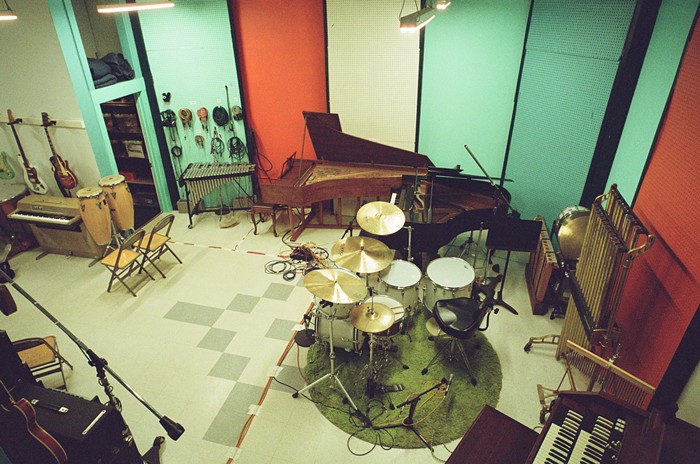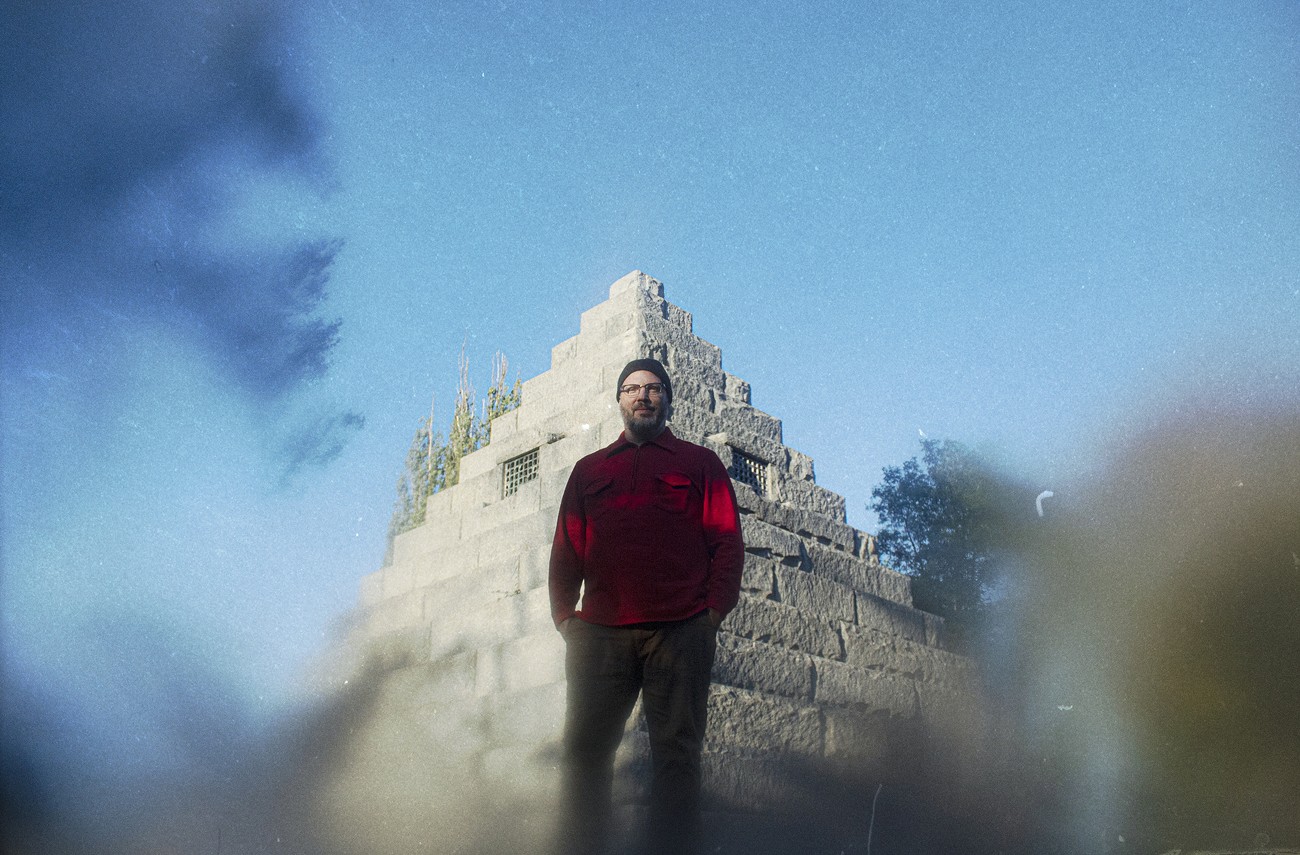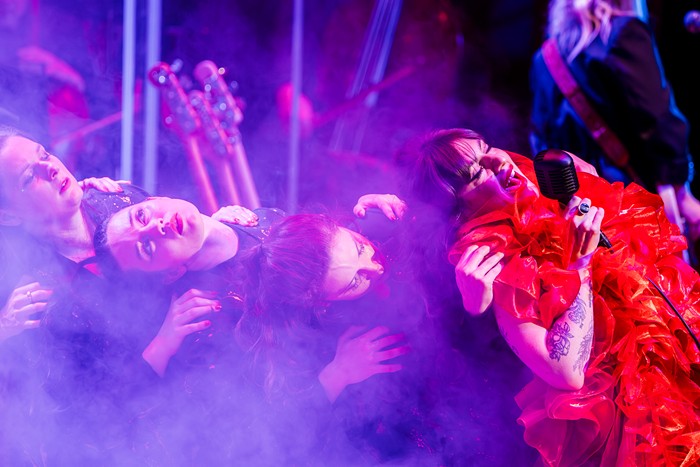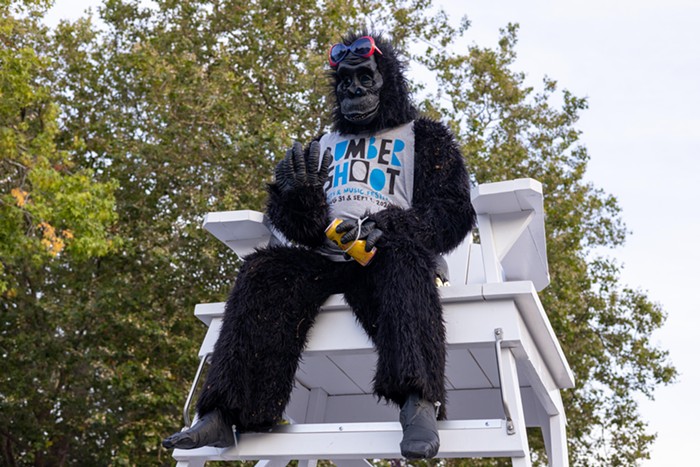Working out of his Everett-based Soundview Analog Recorders studio, Sean Wolcott has become a prodigious creator of eclectic, evocative soundtrack and library music. With regard to the latter genre, the guitarist/composer/producer occupies a tiny niche in the region's musical ecosystem. Aside from Andy "Gel-Sol" Reichel (whose great library single I reviewed on this blog in 2022), the field's pretty much ruled by Wolcott.
Library music—which is created for placement in movies, TV shows, radio, ads, and other media—is, Wolcott says in an interview conducted at Analog Coffee, "kind of like this bizarre creature that's mixed of all of the kind of music I like and is pushing genre in a way that a lot of genre-bound artists don't. It felt really alive." The paradox of library music is that it's utilitarian, yet it's also a breeding ground for some of the boldest, most interesting sounds ever.
Traditionally, it's been rare for an American musician to get involved in European-dominated library music. What's the US scene like right now? "It seems to be evolving, where awareness of library music has expanded a lot," Wolcott says. "I worked on a movie project a few years ago and one of the actors was a young guy who was a huge library-music fan, but he didn't even know the term 'library music.' When I told him this was library music, he said, 'Oh, wow, I love it!' If the uncool goes far enough, it becomes cool. Like easy listening—which I've always been a diehard fan of—is sort of hip and edgy in a way."
Wolcott got into library music in the early 2000s through music blogs, which exposed him to obscure European soundtracks and the rich crop of '60s/'70s Italian composers. "Discovering the Italian soundtracks and library stuff, it was like, okay, this is my realm," Wolcott says. "I delved a lot deeper. Ennio Morricone being the obvious one, but finding people like Stelvio Cipriani, Bruno Nicolai, and the infinite amount of composers from there [further intrigued me]."
Another inspiration came in the form of Jonny Trunk's The Music Library: Graphic Art and Sound (2005), a book that spotlights a dazzling array of library album covers. "At that point, I was doing graphic design as a job, and that appealed to that aspect of things. The sheer creativity in the artwork and the music itself and the contradiction of the extreme experimental aspects, but meanwhile it has commercial intent. Also, the speed at which [library albums] were made and the low cost at which they were made... you have a couple of days to write, a couple of days to record. That spontaneity brings out a lot of inspiration and creativity when you're under those constraints."

Some of Wolcott's commissions come from a Seattle company called License Lab, where his friend and founder, Daniel Holter, works. For the LL imprint Analog Champion, Wolcott's done a '60s psych record [Psych Rock] and a '50s/'60s exotica album [Exotica], both from 2023. The records' attention to period details and execution are phenomenal—and their cuts are surfacing in unusual places. "I'll look at my performance rights statements and see that [a track appeared on a televised football game]. I don't know why the NFL is playing some weird psych track," Wolcott says, laughing.
"My ongoing joke with recording is, I'm not trying to do a Civil War reenactment. I don't fetishize any of these eras. I just think that there's a quality of music I strive for in my own creations."
Besides the aforementioned albums for Analog Champion, Wolcott's released 2022's Il Mietitore cavalca verso ovest (dusky spaghetti Western moves), 2023's Love Is a Funny Game (carefree, orchestral pop redolent of erotic French and Italian films from the '70s), 2023's Violent Hand of the Sleeping City (crime-thriller nail-biters), and 2023's Liquid Landscapes (woozily jazzy themes for undersea nature documentaries).
To achieve his pitch-perfect sounds, Wolcott has stocked his studio with analog recording gear from the '50s to '60s, as well as a 1939 Altec Birdcage ribbon microphone, which his partner in the funk-oriented Wolcott Curran Collective, Craig Curran, uses to record his bass parts. (Curran played in Fleet Foxes from 2006 to 2008.) Also in Wolcott's arsenal is a Scully 280 4-track tape recorder that the Beach Boys used while recording their classic 1966 album, Pet Sounds.

Wolcott's initial musical enthusiasms began with John Williams's scores for Jaws, Star Wars, and Close Encounters of the Third Kind. In the '60s, Wolcott's father had played guitar in a cover band called Willow Run, and young Sean would learn how to play on that instrument. As a sixth grader, Wolcott—who was always drawing as a child—became enamored of arty pop such as 2nu's "This Is Ponderous" and Barnes & Barnes' "Fish Heads." But hearing Nirvana right before Nevermind blew up convinced Wolcott that he wanted to make music his life.
As someone who was so visually oriented from such a young age, though, Wolcott seemed destined to get into soundtracks—both real and imaginary. "With these projects, I tend to approach them almost like they were a soundtrack for a movie—not necessarily in the traditional sense, but I can see it in my mind. I'll plot out the characters, scenes, and story and write for those, versus just coming up with random music. So I'm composing for this movie that's in my mind, which I don't necessarily have any intent to make."
Satisfyingly, tracks from these recordings have been licensed. They also, Wolcott says, "end up being business cards for producing other people, recording for people, things like that." One example is Washington troubadour Damien Jurado, for whom Wolcott has produced two albums and several singles. Expect those results, which "are pushing some exciting new territory" for Jurado this summer.
Wolcott's newest soundtrack in search of a film, Lady Swordfighter, might be his most ambitious. Inspired by his deep appreciation for Japanese culture and music, Lady Swordfighter simulates the spare yet rich music that tingles spines in Japanese samurai thrillers.
Wolcott orchestrated this album to sound as authentic as possible, with considerable help from skilled collaborators such as Aura Ruddell (koto, vocals), Mary Ohno (shamisen, vocals), Hanz Araki (shakuhachi), Patrick Oiye (shamisen), and the drumming ensemble Seattle Kokon Taiko. Lady Swordfighter "was a chance to dive a lot deeper and learn a lot more. Having done so, I feel like it changed me permanently in terms of how I see music. It was me learning a lot more about Japanese scales. My good friend Aura Ruddell—who's of Japanese heritage and has played on several of my albums—learned how to play koto in Japan, so she was a good resource and an encourager to nudge me on my way.
"I'm just an evolved garage-rock-band guy," Wolcott says, laughing. "I don't have any formal musical education. A lot of my musical education is just figuring it out on my own and having some great friends to play with."
Wolcott takes pride in the fact that there are no samples in Lady Swordfighter—or in any of his recordings. "It has oftentimes fooled people, such as [legendary hip-hop producer] Pete Rock, into thinking it's an old record. But that's not really my goal. I'm not trying to make things sound old. I mean, I use a lot of old gear, because I like the way it sounds."
Currently, Wolcott has about 30 concept albums dwelling in his mind, including one revolving around hang gliding. He's also fielding film-scoring offers from directors outside of the Seattle area. "That's a space I want to get into a lot deeper. It's a hard space to penetrate. The rapper Logic just finished doing a film [titled Paradise Records] that's using my music in some different scenes. There are other smaller things, too. Some things are hard to track, since it launders through an ad agency. It continues to plant seeds and opportunities.
"Getting back to library music, there's a kind of an absurdity of some of these things, where it's very specific. And it's specific in a way that doesn't describe a jazz or even a sub-genre of music. It's more thematic. Narrative can challenge genre in exciting ways. The history of recorded film scores has been really good at pushing that. Jonny Greenwood for the Spencer soundtrack, he was fusing jazz with baroque music. It really ties back to library music and how the types of music you wouldn't think to be bedfellows can actually play together quite nicely.
"My whole experience has been me trying to get the thing I want. Going through somebody else's channels has never worked for me, cosmically. If you want it, make it yourself. It's always been my mantra. It's worked thus far."




















